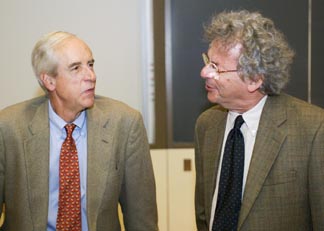Cornell marks first Constitution Day

Cornell University commemorated Constitution Day Friday, Sept. 23, with a discussion that challenged the modern interpretation of one of the living document's most fundamental tenets: the separation of church and state.
"Religion needs to be protected from the state," said interim President Hunter R. Rawlings, reminding the audience of James Madison's efforts to keep religion out of the Constitution. "Men never do evil more completely and cheerfully as when they do it out of religious conviction."
Rawlings and Isaac Kramnick, the R.J. Schwartz Professor of Government, spoke to an audience in Hollis E. Cornell Auditorium in Goldwin Smith Hall about the Constitution, its history and interpretive evolution, and Cornell. The official Constitution Day, called for by legislation passed by Congress in 2004, is Sept. 17, the date on which delegates to the 1787 Constitutional Convention signed the document that was to become the U.S. Constitution. All educational institutions receiving federal funds from the Department of Education are required to participate.
Rawlings drew a parallel between Madison's steadfast commitment to separating religion from the state and Ezra Cornell's pledge to separate religion from the mission of Cornell University.
Kramnick expanded on the volatility of the mix when he took to the podium and described the changing climate that has placed religion in the center of national politics, an involvement that has wide-ranging impact.
"[President] George W. Bush puts his post-conversion relationship with God at the center of who he is," Kramnick said. He compared Bush's outward celebration of personal faith with John F. Kennedy's suppression of his Roman Catholic faith in his 1960 run for the White House.
"Religion will flourish in America and serve as a vast cultural resource only if the government leaves it alone," said Kramnick.
He closed by crediting the framers of the Constitution with creating a remarkable, resilient document that has stood the test of time. "The success of what they did in 1787 and 1788 should still fill us with amazement and gratitude," said Kramnick.
Media Contact
Get Cornell news delivered right to your inbox.
Subscribe